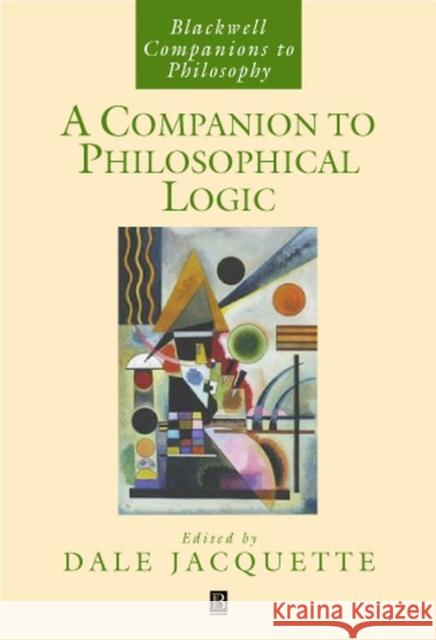A Companion to Philosophical Logic » książka



A Companion to Philosophical Logic
ISBN-13: 9781405145756 / Angielski / Miękka / 2005 / 832 str.
A Companion to Philosophical Logic
ISBN-13: 9781405145756 / Angielski / Miękka / 2005 / 832 str.
(netto: 190,47 VAT: 5%)
Najniższa cena z 30 dni: 198,36
ok. 30 dni roboczych.
Darmowa dostawa!
This collection of newly comissioned essays by international contributors offers a representative overview of the most important developments in contemporary philosophical logic.
- Presents controversies in philosophical implications and applications of formal symbolic logic.
- Surveys major trends and offers original insights.
"Here is a first–class collection of articles by a first–class collection of authors. It covers the full range of philosophical logic from its history through its philosophy to its applications, with a lot of good, solid logic all along the way. Of particular value is the way it presents multiple voices on common topics. This is the way philosophy should be done." Lou Goble, Willamette University
Preface.
Acknowledgments.
List of Contributors.
Introduction: Logic, Philosophy, and Philosophical Logic. (Dale Jacquette).
Part I: Historical Development of Logic.
1. Ancient Greek Philosophical Logic. (Robin Smith).
2. History of Logic: Medieval. (B.G. Sundholm and E.P. Bos).
3. The Rise of Modern Logic. (Rolf George and James Van Evra).
Part II. Symbolic Logic and Ordinary Language.
4. Language, Logic, and Form. (Kent Bach).
5. Puzzles About Intensionality. (Nathan Salmon).
6. Symbolic Logic and Natural Language. (Emma Borg and Ernest Lepore).
Part III: Philosophical Dimensions of Logical Paradoxes.
7. Logical Paradoxes. (James Cargile).
8. Semantical and Logical Paradox. (Keith Simmons).
9. Philosophical Implications of Logical Paradoxes. (Roy A. Sorensen).
Part IV: Truth and Definite Description in Semantic Analysis.
10. Truth, the Liar, and Tarski′s Semantics. (Gila Sher).
11. Truth, the Liar, and Tarskian Truth Definition. (Greg Ray).
12. Descriptions and Logical Form. (Gary Ostertag).
13. Russell′s Theory of Definite Descriptions as a Paradigm for Philosophy. (Gregory Landini).
Part V: Concepts of Logical Consequence.
14. Necessity, Meaning, and Rationality: The Notion of Logical Consequence. (Stewart Shapiro).
15. Varieties of Consequence . (B.G. Sundholm).
16. Modality of Deductively Valid Inference . (Dale Jacquette).
Part VI Logic, Existence, and Ontology.
17. Quantifiers, Being and Canonical Notation. (Paul Gochet).
18. From Logic to Ontology: Some Problems of Predication, Negation and Possibility. (Herbert Hochberg).
19. Putting Language First: The "Liberation" of Logic from Ontology. (Ermanno Bencivenga).
Part VII: Metatheory and the Scope and Limits of Logic.
20. Metatheory. (Alasdair Urquhart).
21. Metatheory of Logics and the Characterization Problem. (Jan Wolenski).
22. Logic in Finite Structures: Definability, Complexity, and Randomness. (Scott Weinstein).
Part VIII: Logical Foundations of Set Theory and Mathematics.
23. Logic and Ontology: Numbers and Sets. (José Benardete).
24. Logical Foundations of Set Theory and Mathematics. (Mary Tiles) 25. Property–Theoretic Foundations of Mathematics. (Michael Jubien).
Part IX: Modal Logics and Semantics.
26. Modal Logic. (Johan van Benthem).
27. First Order Alethic Modal Logic. (Melvin Fitting).
28. Proofs and Expressiveness in Alethic Modal Logic. (Maarten de Rijke and Heinrich Wansing).
29. Alethic Modal Logics and Semantics. (Gerhard Schurz.
30. Epistemic Logic. (Nicholas Rescher).
31. Deontic, Epistemic, and Temporal Modal Logics. (Risto Hilpinen).
Part X: Intuitionistic, Free, and Many–Valued Logics.
32. Intuitionism. (Dirk van Dalen and Mark van Atten).
33. Many–Valued, Free, and Intuitionistic Logics. (Richard Grandy).
34. Many–Valued Logic. (Grzegorz Malinowski).
Part XI: Inductive, Fuzzy, and Quantum Probability Logics.
35. Inductive Logic . (Stephen Glaister).
36. Heterodox Probability Theory. (Peter Forrest).
37. Why Fuzzy Logic?. (Petr Hájek).
Part XII: Relevance and Paraconsistent Logics.
38. Relevance Logic. (Edwin Mares).
39. Paraconsistency. (Bryson Brown).
40. Logicians Setting Together Contradictories: A Perspective on Relevance, Paraconsistency, and Dialetheism. (Graham Priest).
Part XIII: Logic, Machine Theory, and Cognitive Science.
41. The Logical and the Physical. (Andrew W. Hodges).
42. Modern Logic and its Role in the Study of Knowledge. (Peter A. Flach).
43. Actions and Normative Positions. A Modal–Logical Approach . (Robert Demolomb and Andrew J.I. Jones).
Part XIV: Mechanization of Logical Inference and Proof Discovery.
44. The Automation of Sound Reasoning and Successful Proof Finding. (Larry Wos and Branden Fitelson).
45. A Computational Logic for Applicative Common LISP. (J. Strother Moore and Matt Kaufmann).
46. Sampling Labelled Deductive Systems. (D.M. Gabbay).
Resources for Further.
Index.
Dale Jacquette is Professor of Philosophy at the Pennsylvania State University. He is the author of Philosophy of Mind (1994), Meinongian Logic: The Semantics of Existence and Nonexistence (1996), Wittgenstein′s Thought in Transition (1998), Symbolic Logic (2001), David Hume′s Critique of Infinity (2001), and On Boole: Logic as Algebra (2001), as well as numerous articles on logic, metaphysics, philosophy of mind, and Wittgenstein. He is editor of Philosophy of Mathematics: An Anthology (Blackwell 2001) and Philosophy of Logic: An Anthology (Blackwell 2001).
This collection of newly commissioned essays by international contributors offers a representative overview of the most important developments in contemporary philosophical logic. Written by experts from a variety of different logical and philosophical perspectives, the volume presents controversies in philosophical implications and applications of formal symbolic logic.
Each section features contributors currently active in research who explain the central ideas of their special field and take a philosophical stand on recent issues in the intersection of logic and analytic philosophy. Taken together, the essays survey major trends and offer original insights to advance research and philosophical discussion. A Companion to Philosophical Logic provides a comprehensive state–of–the–art handbook for students and professional researchers in philosophical logic.
1997-2026 DolnySlask.com Agencja Internetowa
KrainaKsiazek.PL - Księgarnia Internetowa









